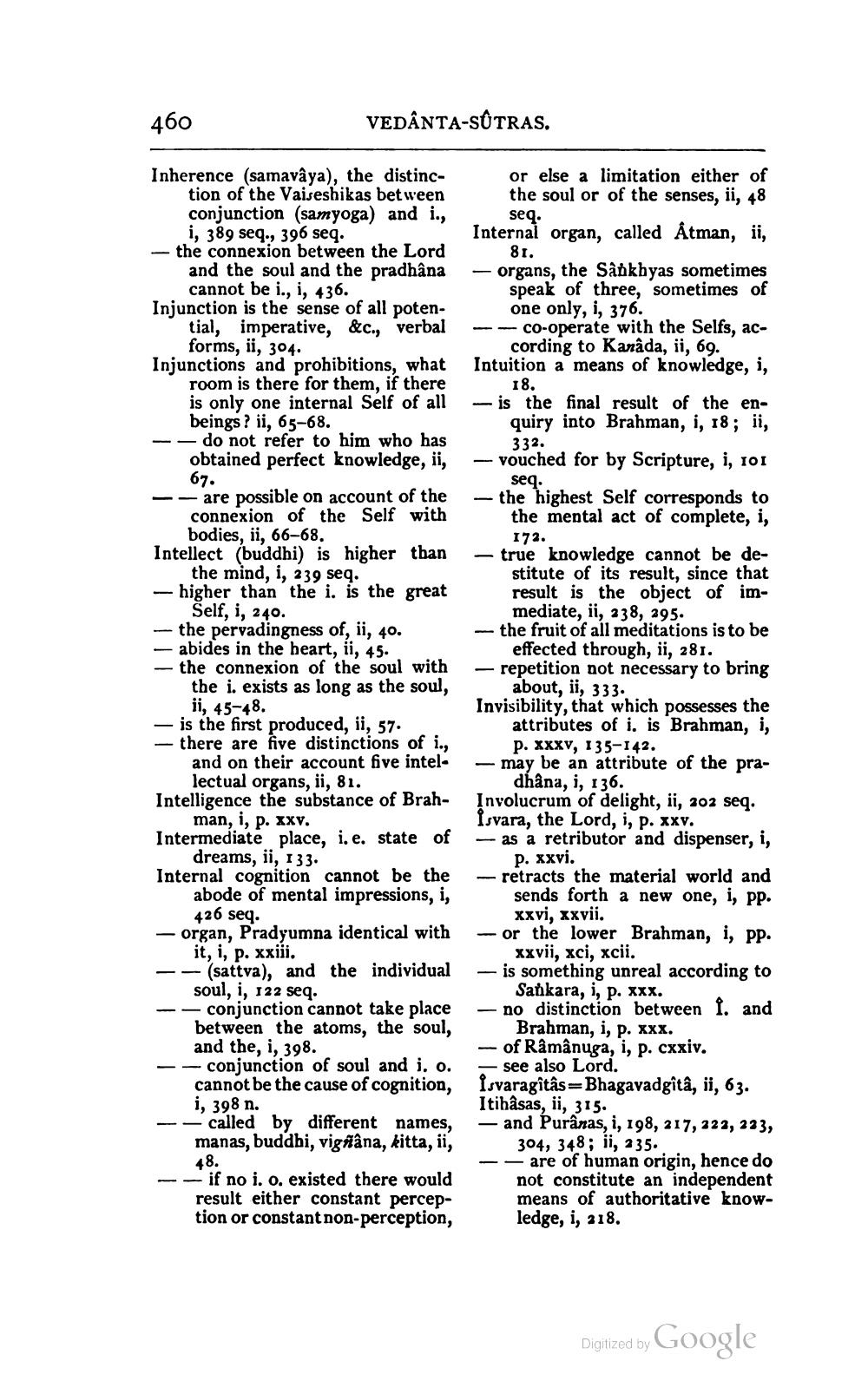________________
460
VEDÂNTA-SÛTRAS.
Inherence (samavaya), the distinc
tion of the Vaiseshikas between conjunction (samyoga) and i.,
i, 389 seq., 396 seq. - the connexion between the Lord
and the soul and the pradhana
cannot be i., i, 436. Injunction is the sense of all poten
tial, imperative, &c., verbal
forms, ii, 304. Injunctions and prohibitions, what
room is there for them, if there is only one internal Self of all
beings ? ii, 65-68. -- do not refer to him who has
obtained perfect knowledge, ii,
67. --are possible on account of the
connexion of the Self with
bodies, ii, 66-68. Intellect (buddhi) is higher than
the mind, i, 239 seq. - higher than the i. is the great
Self, i, 240. - the pervadingness of, ii, 40.
abides in the heart, ii, 45. - the connexion of the soul with
the i. exists as long as the soul,
ii, 45-48. - is the first produced, ii, 57. - there are five distinctions of i.,
and on their account five intel®
lectual organs, ii, 81. Intelligence the substance of Brah-
man, i, p. xxv. Intermediate place, i.e. state of
dreams, ii, 133. Internal cognition cannot be the
abode of mental impressions, i,
426 seq. - organ, Pradyumna identical with
it, i, p. xxiii. --(sattva), and the individual
soul, i, 122 seq. - conjunction cannot take place between the atoms, the soul, and the, i, 398. - conjunction of soul and i, o.
cannot be the cause of cognition, - called by different names, manas, buddhi, vigñana, kitta, ii, 48. - if no i. o. existed there would result either constant perception or constant non-perception,
or else a limitation either of the soul or of the senses, ii, 48
seq. Internal organ, called Atman, ii,
81. - organs, the Sankhyas sometimes
speak of three, sometimes of
one only, i, 376. -- Co-operate with the Selfs, ac
cording to Kanada, ii, 69. Intuition a means of knowledge, i,
18. is the final result of the en
quiry into Brahman, i, 18; ii,
332. - vouched for by Scripture, i, 101
seq. - the highest Self corresponds to
the mental act of complete, i,
172. - true knowledge cannot be de
stitute of its result, since that result is the object of im
mediate, ii, 238, 295. - the fruit of all meditations is to be
effected through, ii, 281. - repetition not necessary to bring
about, ii, 333. Invisibility, that which possesses the
attributes of i. is Brahman, i,
P. XXXV, 135-142. - may be an attribute of the pra
dhầna, i, 136. Involucrum of delight, ii, 202 seq. Isvara, the Lord, i, p. xxv. -as a retributor and dispenser, i,
P. xxvi. retracts the material world and
sends forth a new one, i, pp.
xxvi, xxvii. - or the lower Brahman, i, pp.
xxvii, xci, xcii. - is something unreal according to
Sankara, i, p. XXX. - no distinction between 1. and
Brahman, i, p. xxx. - of Râmânuga, i, p. cxxiv. - see also Lord. Isvaragitâs=Bhagavadgitâ, ii, 63. Itihâsas, ii, 315. - and Puranas, i, 198, 217, 222, 223,
304, 348; ii, 235. - are of human origin, hence do not constitute an independent means of authoritative knowledge, i, 218.
i, 398 n.
Digitized by
Digitized by Google




